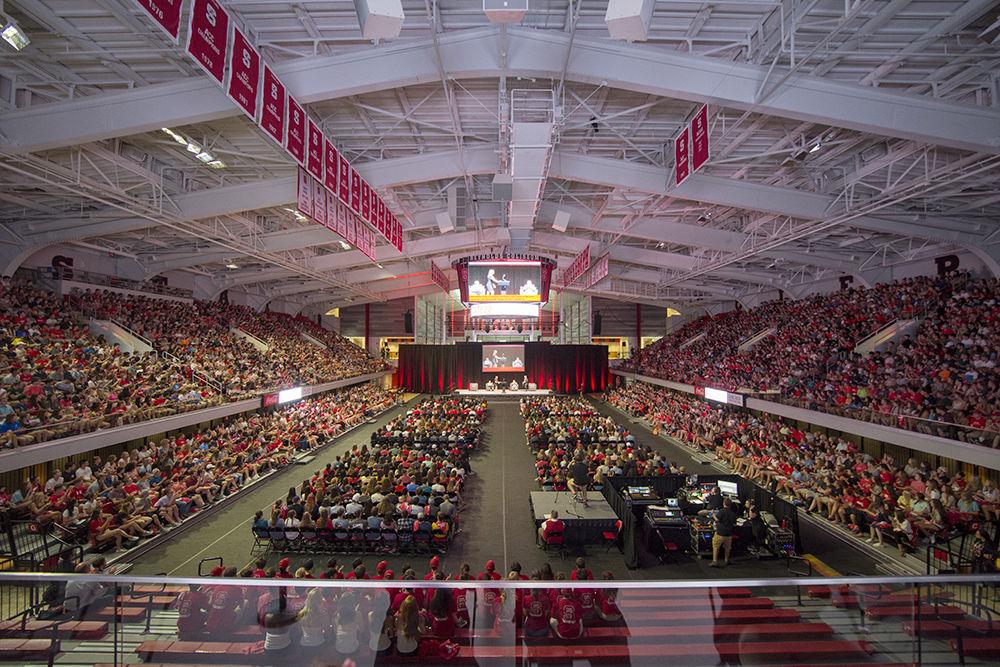Convocation this Monday welcomed 4,900 first-year students, the largest amount in the university’s history, as well as 1,800 transfer students to NC State. The event’s major focus was on the reality of food and housing insecurity in the U.S., as well as the impact on NC State’s campus.
New students were welcomed in remarks by Student Body President, Jess Errico, Vice Chancellor and Dean for Academic and Student Affairs, Mike Mullen, Chancellor Randy Woodson and keynote speaker Kathryn Edin, the author of the 2018 common reading, ‘$2.00 a Day, Living on Nothing in America.’
Errico started off encouraging all students to speak up, stand up and listen up as they enter into their first year as part of the Wolfpack.
“NC State is just as much yours as it is any other student’s, so take ownership of what it means to be part of the pack,” Errico said. “Stand up for your peers, for your community, stand in solidarity, stand in protest, in respect, stand with dignity and afford the same to others. Class of 2022, speak up to share, listen to learn and stand with the Wolfpack.”
According to Chancellor Woodson, the Class of 2022 is the largest in University history and for the first time in its history, there are just as many women as men.
“This is a place that has been male-dominated for far too long,” Woodson said. “So, for the first time in our history, our undergraduate population is 50/50.”
Kathryn Edin, the keynote speaker, spoke to educate the new students on a topic that impacts individuals on and off NC State’s campus, Food and Housing Insecurity.
Edin said that she was initially shocked by the results of research she had done about families facing poverty in the US.
“While we started out in 1996 with 1.7 percent of families with children experiencing virtually cashless lives,” Edin said. “That number was almost 5 percent, almost 1 in 4 children by 2013.”
She went further to emphasize that at that point it was important to dig deeper to seek the populations that were struggling on a daily basis.
“One thing you learn if you become a scientist of any kind, or actually a humanist, is that you have to keep going, you have to keep pressing, you have to keep exploring,” Edin said. “One of your Deans just said a good scholar is a skeptic, that’s true.”
Edin told students that the issue is something that needs to be addressed immediately.
“We can argue about the causes and consequences of poverty and what to do about it, but can anyone really argue that we’ve solved it?” Edin asked.
Coleman Williams, a first-year in exploratory studies, said that he felt like this was a topic that needed to be brought up to students
“I think it’s something really important that a lot of kids especially don’t really take into account or think about and a lot probably don’t care about,” Williams said. “But, it’s a really big issue that’s facing our country and it’s something that I felt was really important that we needed to talk about.”
Mullen encouraged students to take the information they just received and use it charge to take them through their college careers. He spoke about how food and housing insecurity impacts NC State’s campus daily.
“We have students on our campuses nationally that get by on too little,” Mullen said. “Here on our campus the problem is not as pronounced as it is in some places. But still, 9-10 percent of our students here at NC State at some time or another in the year are experiencing food insecurity, they’re going hungry.”
According to Mullen, 14-15 percent of students experience housing insecurity. He emphasized that this year, NC State will focus on doing more for the groups of students who are undergoing these experiences.
A new initiative called Pack Meals Share, organized by Student Government in cooperation with Dining, was announced during Convocation. At the end of the semester during finals week, students will be able to donate any extra meal credits they have left to other students.
“All of you have food plans and many of you have guest meals on those food plans,” Mullen said. “You can donate those guest meals back into the pool and others who may not be able to afford a meal can use those to eat in our dining halls.”
At the event, Pack the Pantry held a drive collecting food donations and students were encouraged to bring food to Pack the Pantry in the Quad.
Jeanine Hasty, a first-year studying graphic design, said that she was surprised at the number of NC State students that are struggling to find food to eat every day.
“You don’t really think that the people around you are struggling to get food or go to a meal,” Hasty said. “You have the luxury of getting a meal plan and it’s taken care of, but there are a lot of other people, they don’t have that.”
Student Emergency funds and meal plan scholarship funds have also been developed in order to help students who may not be able to afford buying a meal plan. Students were also recommended to visit the site PackAssist if they or someone they know is experiencing food or housing insecurity.








